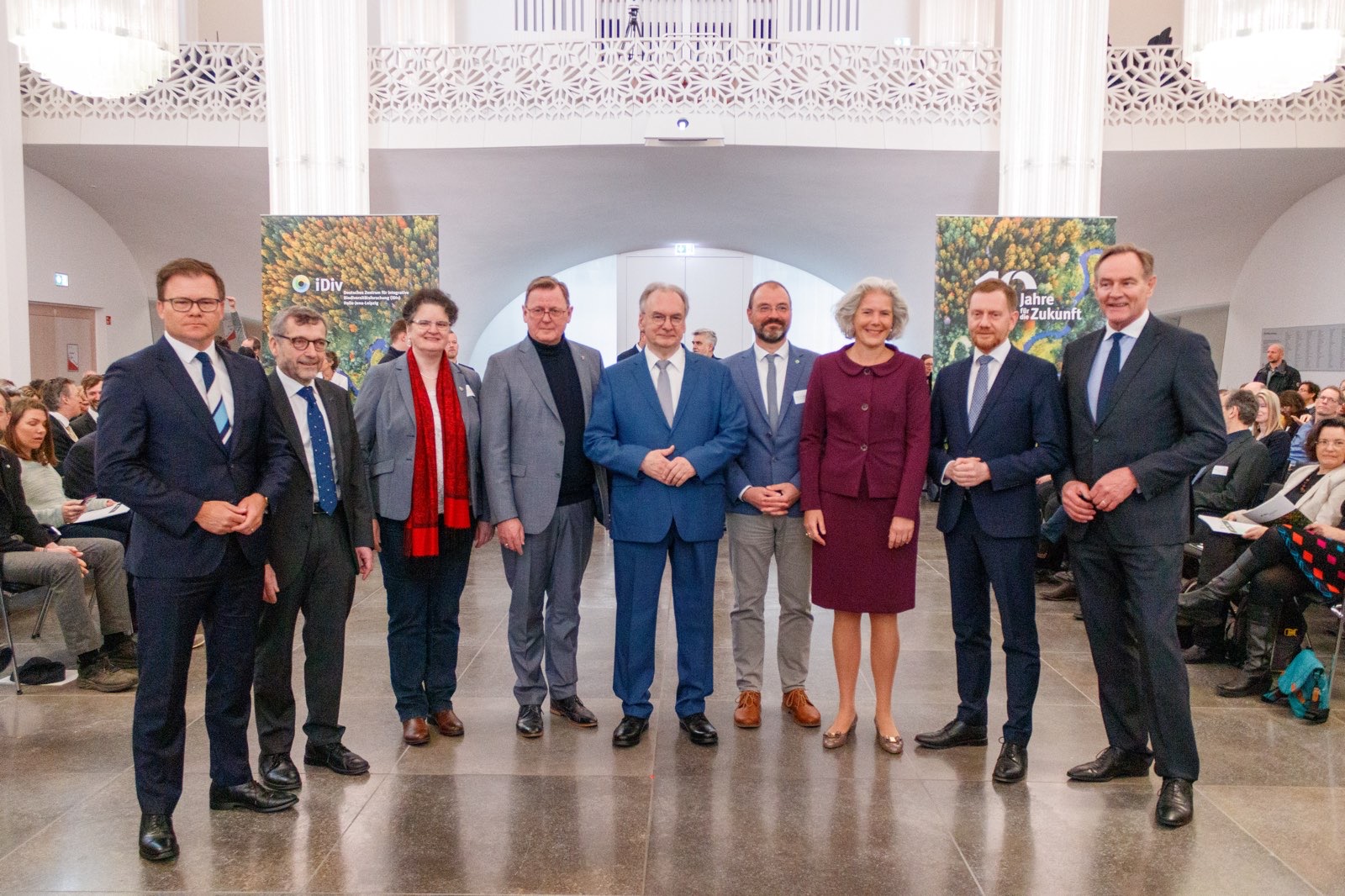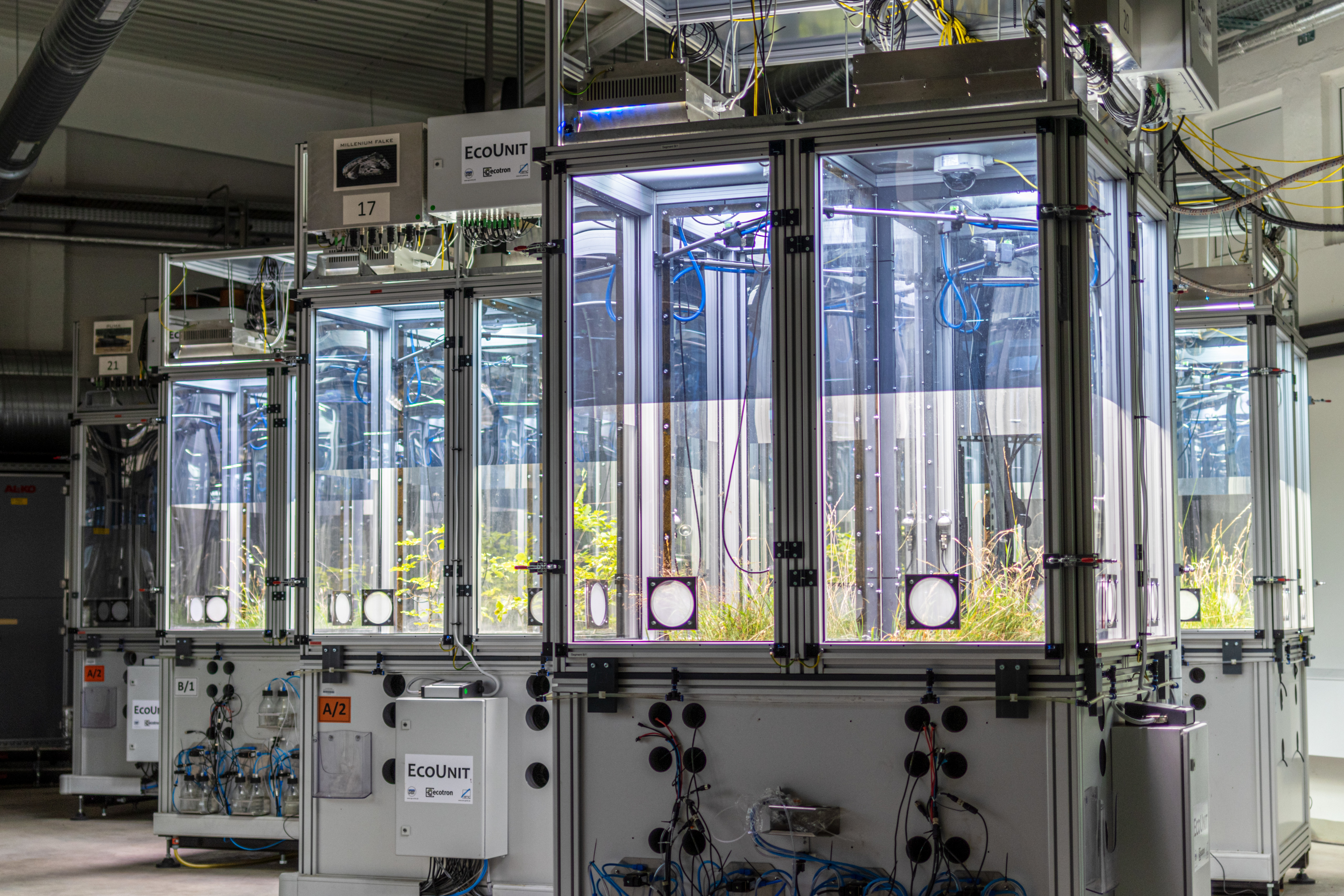20.04.2023 | iDiv, Media Release, TOP NEWS
The German Centre for Integrative Biodiversity Research (iDiv) celebrated its 10th anniversary today with a ceremony in the Leipzig University Paulinum. Over 300 guests from politics, science and civil society took part, including the ministers-president of Saxony, Saxony-Anhalt and Thuringia, Michael Kretschmer, Dr Reiner Haseloff and Bodo Ramelow as well as the Federal Government Commissioner for eastern Germany, Carsten Schneider. They acknowledged the research centre’s important contributions to the protection of biological diversity. In his welcoming message, Federal Chancellor Olaf Scholz stressed the importance of “world-class basic research” for international biodiversity policy.
Participants in the celebrations included (from left to right): Minister of State Carsten Schneider; Prof Walter Rosenthal, president of the Friedrich Schiller University Jena; Prof Claudia Becker, rector of the Martin Luther University Halle-Wittenberg; Bodo Ramelow, minister-president of Thuringia; Dr Reiner Haseloff, minister-president of Saxony Anhalt; iDiv Speaker Prof Christian Wirth; Prof Eva Inés Obergfell, rector of Leipzig University; Michael Kretschmer, minister-president of Saxony; Burkhard Jung, mayor of the city of Leipzig
In the iDiv Ecotron, researchers manipulate biodiversity and study the consequences for many ecosystem functions
Alongside the contributions from politicians, biodiversity research itself was an important feature of the event. Scientists presented highlights of iDiv research and their significance for the development of effective measures to combat the biodiversity crisis. Guest speaker, Ana María Hernández Salgar, Chair of the Intergovernmental Science-Policy Platform on Biodiversity and Ecosystem Services IPBES, emphasised the importance of iDiv’s findings for evidence-based biodiversity policy at local, national and global levels. All speakers affirmed the excellence and worldwide visibility of the research centre.
Olaf Scholz, Federal Chancellor: “Congratulations on ten years of world-class basic research! This is how scientific excellence is created, excellence which the Intergovernmental Science-Policy Platform on Biodiversity and Ecosystem Services and the Intergovernmental Panel on Climate Change turn to again and again. This strengthens the German voice on the international stage.”
Carsten Schneider, Minister of State and Federal Government Commissioner for eastern Germany: “The creation of iDiv was possible because this form of cooperation enjoys the express support of the three federal states and the federal government. Excellent science needs outstanding conditions. This form of 7 cooperation can stand as a model for the whole of eastern Germany, indeed for the entire Federal Republic. We need more ‘iDiv’”.
Michael Kretschmer, Minister President of the Free State of Saxony: “iDiv is unique in the complex area of biodiversity research. It bundles the activities of many stakeholders from science across national borders most impressively and clearly shows what the focusing of research, scientific cooperation and keen collaboration can achieve for the common goal.”
Dr Reiner Haseloff, Minister President of Saxony-Anhalt: “Today, iDiv stands as one of the world’s leading locations for biodiversity research. It attracts the best scientists from all over the world and has become a magnet for research and a beacon for our region. Here, biodiversity is examined in its full complexity. I wish this were the standard approach for all issues, especially those of relevance to society as a whole.”
Bodo Ramelow, Minister President of the Free State of Thuringia: “For 10 years now, iDiv has been researching and developing – also with considerable support from Thuringia – the fundamentals of the preservation of biodiversity and thus the basis of all life on earth. Our planet is dynamic – and, given the current biodiversity crisis, unfortunately also in a negative way. The research achievements of the last few years can, therefore, not be overestimated. I say, ‘Congratulations!’”
Dr Heide Ahrens, Secretary General of the Deutsche Forschungsgemeinschaft (DFG, German Research Foundation): “iDiv fulfils everything the DFG understands as excellent research. It is an outstanding intermediary between science and politics. In the face of devastated ecosystems and biological impoverishment, it would be highly desirable if iDiv were significantly strengthened by the three federal states and the federal government in the future.”
Prof Dr Walter Rosenthal, Chairman of the iDiv Board of Trustees and President of the Friedrich Schiller University Jena: “Ten years of iDiv – that’s ten years of internationally competitive research on one of humanity’s most pressing issues: the preservation of biodiversity. In the last decade, almost 1,000 researchers have worked to identify the drivers and consequences of changes in biodiversity, and to develop models and concrete proposals for measures to effectively counteract the changes. The fact that iDiv enjoys the highest international 8 reputation is evident from the many high-profile publications in the most renowned journals, and from its participation in important committees dealing with the issue of biodiversity.”
Prof Dr Christian Wirth, iDiv Speaker: “These have been an eventful and moving few years. 10 years for the future, because the last 10 years were really just the beginning: The tasks of stopping biodiversity loss and using its potential to move forward sustainably are enormous. Political will has grown, but implementation will continue to require excellent research in the future. We are ready for that.”
Background:
Changes in ecosystems and biotic communities, and the loss of species are among the greatest challenges of our time. Changes in land use, direct exploitation, climate change, and pollution threaten the biological diversity of the planet. The Intergovernmental Science-Policy Platform on Biodiversity and Ecosystem Services estimates that around one eighth of all animal and plant species are threatened with extinction – with negative consequences for the functioning of ecosystems.
For 10 years, iDiv scientists have been researching global changes in biological diversity and developing the foundations of evidence-based policy and practice. The research centre integrates a wide range of research fields, from molecular interactions between animals and plants to global trends in biodiversity change. For example, iDiv researchers recently found that species with small areas of distribution are at particularly high risk, while at the same time, the threat is reduced when these species live in protected areas.
iDiv has developed into a globally visible beacon of biodiversity science. More than 300 employees from 40 nations currently work at the research centre. In addition, more than 150 member groups of the scientific network conduct research at various locations in Halle, Jena and Leipzig. iDiv is run together with the Martin Luther University Halle-Wittenberg and the Friedrich Schiller University Jena, as well as in cooperation with the Helmholtz Centre for Environmental Research – UFZ; seven Leibniz and Max Planck institutes are involved as cooperation partners. Up to now, iDiv has been funded by the German Research Foundation (DFG). In 2024, the three states of Saxony, Saxony-Anhalt and Thuringia, together with other partners, will take over the basic financing of the research centre.
Contact:
Dr Volker Hahn
Head of Media and Communications
German Centre for Integrative Biodiversity Research (iDiv) Halle-Jena-Leipzig
Phone.: +49 341 97 33154
EMail: volker.hahn@idiv.de
Web: https://www.idiv.de/media
Note for the media: Use of the pictures provided by iDiv is permitted for reports related to this media release only, and under the condition that credit is given to the picture originator.

